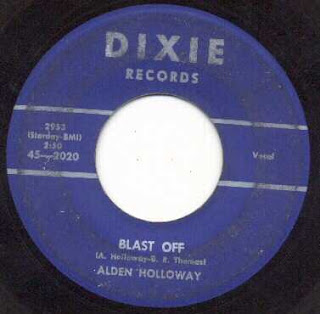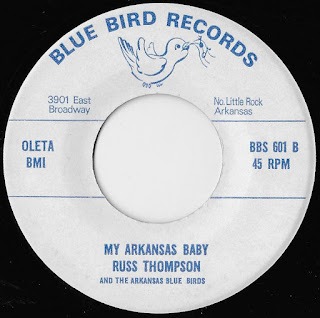Tulsa has been a city full of music for long and it was especially a hot bed for western swing music since the 1930s, mainly due to the presence of Bob Wills & the Texas Playboys and the various bands that developed out of it, led by Wills companions like his brother Johnnie Lee Wills or his former steel guitarist Leon McAuliffe. One of Tulsa's later stars was singer and DJ Marvin McCullough, who enjoyed great popularity in the area in the early 1960s.
McCullough was born on September 13, 1934, in Birmingham, Alabama, and collected his first experiences in the radio business on Alabama stations WGAD out of Gadsden and on WANA in Anniston. Nothing else is known about this early stage in his career.
Probably his first recordings were made in the mid 1950s with the Acme record label from Manchester, Kentucky. Today, the label is best remembered for its traditional bluegrass, gospel, and country music releases and it is probable that McCullough's first sides were in a similar style. Acme #1210 was his first release and coupled "I Think I'm Falling in Love with You" with "I Can't Tell My Heart". It was followed by Acme #1215, two religious song performed with support by the Keck Brothers, "The Bible in Song" b/w "My Lord Is Coming Home from Heaven". Although these cuts seem to be McCullough's earliest recordings, no exact release date has been documented or can be traced as Acme releases are hard to date.
In 1950, McCullough joined the staff of KWHN in Fort Smith, Arkansas, near the Arkansas-Oklahoma state border. He remained with the station for five years but also had a very popular morning program in 1953-1954 on KFSA in Fort Smith. In 1955, switched to KRMG in Tulsa, which broadcast out of Leon McAuliffe's Cimarron Ballroom. By 1958, McCullough was appearing regularly with Gene Mooney's Westernaires, a local Tulsa western swing combo that was around for many years, appearing in Northeastern Oklahoma and Northwestern Arkansas. McCullough formed his own band in 1961.
By the early 1960s, McCullough had become the top country music DJ in town. By then, he performed western swing, the predominant style in that region. Billy Parker, steel guitarist and band leader himself, remembered that at one time in the early 1960s, McCullough had three shows daily: one in the morning, a lunchtime show (a slot he had taken over from Leon McAuliffe), and a midnight show. "People would come in as a studio audience and watch him when he was on the radio. The studio room probably had seats for 40 people, but there was never enough room. People would standing around against the walls. Even on his midnight show, he had a studio full," remembered Ira "Rocky" Caple, McCullough's steel guitarist and band leader in his own right, in a 1990s interview with John Wooley.
In 1961, McCullough began recording for local Oklahoma labels, first for Carl Blankenship's Razorback label from Muskogee, located near Tulsa. Blankenship had been a DJ on KWHN in Fort Smith, too (McCullough knew him likely through their mutual days at the station), and had booked Mooney and the Westernaires into several places during the late 1950s. McCullough and his band released "Bitter Tears", sung by Jimmy Hall, and "Sawed Off Shot Gun", an instrumental spotlighting the steel guitar skills of Rocky Caple.
 |
| Billboard May 15, 1961, C&W review |
His most popular record came that same year with a song called "Just for a Little While", which saw release in May on the Boyd label (#BB-3383) from Oklahoma City. Both the A side and the B side, "Mayby My Baby", were written by successful songwriter Eddie Miller. "Just for a Little While" was a top seller and saw national distribution by United Artists. Following the success, Boyd released another single by McCullough in 1961.
 |
| Billboard November 6, 1961 |
The unsuccessful run at Capitol seems to have stopped McCullough's career as a recording artist but he continued to work as a DJ. He began working for KFMJ (Tulsa) in 1968 and worked as the station's music director.
In 1971 or 1972, McCullough returned to Alabama and continued to work in radio. "I believe Marvin came to Anniston, Alabama, because his parents were retired there," remembered Fred Azbell, who was a 22 years young radio DJ in the early 1970s, and whom I found through my researches on McCullough. While Azbell was the nighttime announcer on the station, McCullough took over the afternoon shift. Azbell continued: "I got to know Marvin when I worked with him at WANA in Anniston [...]. He had a really wild lifestyle and could not maintain his pace without help from amphetamines. He made more money doing radio remote broadcasts than most people made all week in radio. He was a born entertainer. I was only about 21 or 22 in those days and I always got a kick out of his stories of working in Tulsa."
McCullough played ocassional gigs in Anniston but obviously had stopped recording. "He had lots of old recordings on the Capitol label. He would always claim they were a brand new release, though it was obvious that they were old," Azbell recalls. McCullough's life would take a serious turn, when he went to jail in 1975, as he had shot WANA morning announcer Randy Carter at a gas station between Anniston and Oxford late one night. Apparently, he did not spent too much time behind prison bars: "I have no idea how he beat that attempted murder charge. [...] He was definitely in jail for a while. I don't know the whole story but a mutual friend visited him in jail in Talladega and said he was in pretty bad shape," retells Azbell the story. "I have no idea where he went after that," he concludes.
McCullough was out already the following year and continued to work as a DJ. Though, he had to change stations and wound up on WKSJ in Mobile, Alabama. Though, this was probably for a short time only. Unfortunately, there is no documentation about how he spent the following years.
McCullough had a stroke in 1991, by then he was in his mid 50s. In the late 1990s, he had returned to his old stomping grounds, the Arkansas-Oklahoma border region, and hosted a gospel music radio show in Oklahoma. His turbulent life came to an end in 1998 in Fort Smith, Arkansas, just two weeks after his wife had died.
Acme 1215: Marvin McCullough and the Keck Brothers - The Bible in Song / My Lord Is Coming Back from Heaven
Razorback 45-113: Bitter Tears (with Jimmy Hall) / Sawed Off Shot Gun (with Rocky Caple) (1961)
Boyd BB-3383: Just for a Little While / Mayby My Baby (1961)
Boyd UA-345: Just for a Little While / Mayby My Baby (1961)
Boyd BB-111: Are You Still in Love with Me / Pillow To My Right (1961)
Capitol 4820: Just Inside Your Arms / Where Else Could I Go (But to Her Arms) (1962)
Capitol 5030: Stranger In My Arms / "If" Is a Mighty Big Word (1963)
• Special thanks to Fred Azbell and John Strauss for providing their memories and recollections about Marvin McCullough.
































